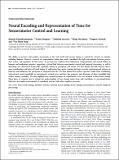Neural Encoding and Representation of Time for Sensorimotor Control and Learning
Author(s)
Balasubramaniam, Ramesh; Haegens, Saskia; Jazayeri, Mehrdad; Merchant, Hugo; Sternad, Dagmar; Song, Joo-Hyun; ... Show more Show less
DownloadPublished version (1.077Mb)
Publisher with Creative Commons License
Publisher with Creative Commons License
Creative Commons Attribution
Terms of use
Metadata
Show full item recordAbstract
The ability to perceive and produce movements in the real world with precise timing is critical for survival in animals, including humans. However, research on sensorimotor timing has rarely considered the tight interrelation between perception, action, and cognition. In this review, we present new evidence from behavioral, computational, and neural studies in humans and nonhuman primates, suggesting a pivotal link between sensorimotor control and temporal processing, as well as describing new theoretical frameworks regarding timing in perception and action. We first discuss the link between movement coordination and interval-based timing by addressing how motor training develops accurate spatiotemporal patterns in behavior and influences the perception of temporal intervals. We then discuss how motor expertise results from establishing task-relevant neural manifolds in sensorimotor cortical areas and how the geometry and dynamics of these manifolds help reduce timing variability. We also highlight how neural dynamics in sensorimotor areas are involved in beat-based timing. These lines of research aim to extend our understanding of how timing arises from and contributes to perceptual-motor behaviors in complex environments to seamlessly interact with other cognitive processes.
Date issued
2021Department
Massachusetts Institute of Technology. Department of Brain and Cognitive Sciences; McGovern Institute for Brain Research at MITJournal
Journal of Neuroscience
Publisher
Society for Neuroscience